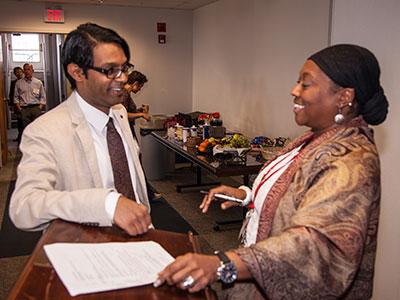Exploring in depth the concept of multi-religious belonging in the light of lived experiences, and discerning how churches can respond to it from pastoral and theological perspectives, was the focus of a consultation organized by the World Council of Churches (WCC) and the United Church of Christ (UCC) from 20 to 23 April in Cleveland, Ohio, the United States. The event opened a long overdue conversation on an important but seldom acknowledged reality within a number of churches across the globe.
Multiple-religious belonging is understood as a phenomenon where people identify themselves with, or participate ritually in, more than one religious tradition or embody religious hybridity through circumstances (borne out of mixed marriages) or choice.
Rev. Karen Georgia Thompson, ecumenical and interfaith officer of the UCC and the key organizer of the conference, noted the need for awareness about the theme. “The dynamic global world creates new possibilities of inter-religious marriages, breaking the boundaries of conventional religious and cultural beliefs and practices. Additionally, there are increasing numbers of persons who were raised in multi-religious households and are at ease in living within the traditions of parents and relatives,” said Thompson.
She said that “hospitality and hybridity allow individuals to seek their own spirituality and values at the intersection of different faith traditions.” According to Thompson, such a context poses challenges for the church to consider. “When you have people or families living in dual faiths, what is the pastoral response and how do you minister effectively to those people?” she asked.
Rev. Dr Peniel Rajkumar, the WCC's programme executive for inter-religious dialogue and cooperation, shared that in recent years the WCC had opened up discussion, for the first time, among churches on the theme of multi-religious belonging. He said the Cleveland event was follow up to a WCC consultation held in collaboration with the Gurukul Lutheran Theological College and Research Institute, Chennai, India, last year. He acknowledged that “multiple religious belonging brings forth hard questions to ecumenical tables concerning the identity, theology and mission of the church”.
“I hope that the consultation in Cleveland would help more churches to explore appropriate responses to multiple religious belonging – responses that are theologically credible, pastorally sensitive and inter-religiously accountable,” said Rajkumar.
“Opening this conversation on a pertinent yet provocative theme is a defining moment for inter-religious dialogue,” he added.
He went on to say that “dialogue can never be business as usual because multiple-religious belonging pushes our conversations to re-visit notions of identity, re-think mission and re-articulate Christian discipleship in a context where new forms of religious hybridity challenge the church to embrace new and radical forms of hospitality in creative fidelity to the gospel of Christ”.
Participants who attended the consultation came from the National Council of the Churches of Christ in the USA, the Canadian Council of Churches, the United Church of Christ, Andover Newton Theological School, Claremont School of Theology, the United Church of Canada, the Anglican Church of Canada, the Unitarian Universalist Association, the Presbyterian Church USA, the Massachusetts Council of Churches, the Seminary Consortium for Urban Pastoral Education, the Gurukul Lutheran Theological College in Chennai, India and Hanshin University.
Bringing the church into the dual belonging dialogue (UCC news release)





